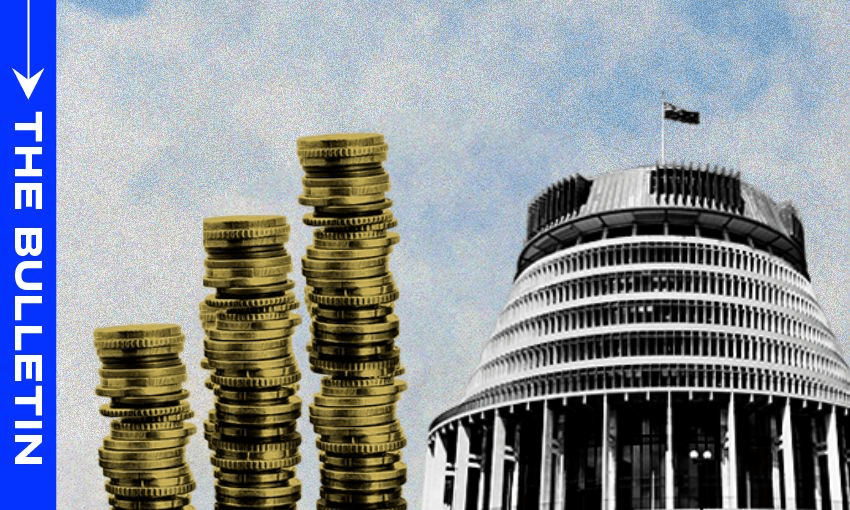Politicians squirmed when asked about pay rises this week. It’s not their call, and the authority that makes the decision has been working on a fundamental review of MPs’ pay due to be released at the end of the month, writes Anna Rawhiti-Connell in this excerpt from The Bulletin, The Spinoff’s morning news round-up. To receive The Bulletin in full each weekday, sign up here.
A big pay rise would make Nicola Willis ‘really, really, really uncomfortable’
What MPs, ministers, party leaders and the prime minister get paid bubbled to the surface this week following a story from Newstalk’s Jason Walls that indicated a decision from the Remuneration Authority was due at the end of this month. Since then, both prime minister Christopher Luxon and Labour party leader Chris Hipkins have sought to stress the independence of the Authority, fully aware of the “optics” of a pay rise for MPs in the current climate. On Monday, finance minister Nicola Willis told Newstalk, “I would be very uncomfortable if I got offered a big pay rise now. That would make me really, really, really uncomfortable”. Former attorney general Chris Finlayson argues that MPs probably deserve a pay rise. Speaking to RNZ’s Checkpoint, Finlayson said turning down pay rises was “virtue signalling”. “They should be completely indifferent to what they receive and just accept it and get on with it.”
Topical comparisons with police pay likely
Divorced from the optics and lived realities of the current day (probably impossible), the question perhaps is not whether MPs deserve a pay rise right now but whether people feel that what they are paid now is fundamentally fair. That might be an especially pointy question following the repeal of the short-lived Fair Pay Agreements legislation. There are basic points of comparison like average wages and topical comparsions with what teachers, nurses and cops get paid. Police minister Mark Mitchell conceded yesterday that New Zealand couldn’t compete with police pay packets on offer in Australia. The teacher comparison is used frequently and often effectively. Prior to the establishment of the Remuneration Authority in 1977, secondary school teachers in the top income bracket were paid more than backbench MPs. There are undoubtedly other factors, like whether we like particular MPs or what our own leanings are. I think there are fair cases on both sides of the argument.
‘Only the rich or the “virtue signallers” will consider becoming MPs’
Finlayson says he worries that without high salaries, only the rich or the “virtue signallers” will consider becoming MPs. As Stuff’s Susan Edmunds reports this morning, backbencher MPs “are currently being paid the lowest salary relative to the country’s average wage since the 1970s.” We know very well that the job of being an MP, minister, party leader or prime minister is demanding and stressful, to the point of breakdown for some. Not a valedictory speech goes by without mention of the sacrifice MPs’ families make. A routine day (yesterday) for both Luxon and Hipkins might involve being presented with research telling them the public thinks they are a bald, dumb idiot (Luxon) or a weak, useless idiot (Hipkins). There is still a sizable river of filth that flows on social media about former prime minister Dame Jacinda Ardern.
On the other hand, the job is one of substantial power, privilege and influence. There are perks, some retained after they leave. Former MPs seldom struggle to find new or high-paying jobs after leaving parliament, often leveraging the access to power and influence they had as an MP. Mere mortals just have to bump about in the job market. Only a handful of MPs don’t own property. There have long been concerns about a distance emerging between MPs and constituents based on wealth and class. In his 9th Floor interview with Guyon Espiner, former Labour prime minister Mike Moore described the current day Labour party as “full of people who are an upper class in nature, private schools, and who now lecture us about what we should do.” On the other side of the aisle, two out of three National prime ministers in the last decade have been independently wealthy people.
Review of MPs pay packets has been underway since late last year
The Remuneration Authority is precisely designed to avoid being politicised. Speaking to The Post’s Luke Malpass late last year, Geoff Summers described the review that’s been underway as “greenfields” with all options on the table. Despite it having been six and a half years since MPs had a pay rise, a Remuneration Authority spokesperson told Walls that the decision won’t be retrospective. There won’t be a bid to “recoup what was lost through the various pay freezes.” The Authority’s findings are binding unless the government changes the law, and Walls describes the looming decision as a “pickle” for Luxon. He may very well have to swallow it despite how it looks. In tangentially related vegetable news if pickles aren’t your jam, people in South Korea are currently protesting the cost of living and “out of touch” politicians by waving spring onions.
